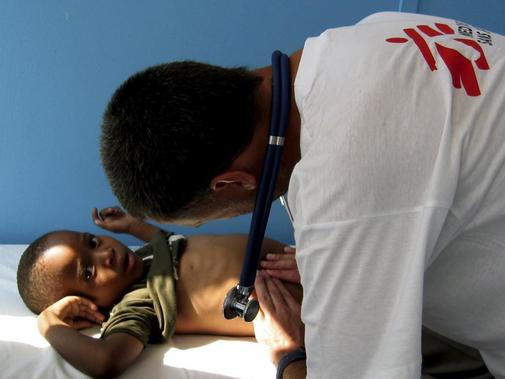- Milestone: Spanish scientists manage to 'eliminate' HIV in a patient for the second time in the world
- Research: An oncological drug could be key to treating HIV
HIV in children remains a global challenge. Despite the great advances made in the prevention and control of maternal-fetal transmission, the virus still reaches the smallest . In fact, according to UNAIDS estimates, 300 to 500 childhood infections occur in sub-Saharan Africa.
Antiretroviral therapy is effective in pediatric age and is able to stop an infection that, due to the immaturity of the childhood immune system, could progress very quickly. However, its current application in countries with limited resources may not be optimal , judging by the results of a new study.
In many of the settings hit by the HIV epidemic, the administration of treatments in infants is indicated, at best, between the fourth and sixth week of life. Instead, this new research shows that starting antiretroviral therapy early, in the early hours of the baby's life, brings much more benefits to the little ones.
Specifically, this strategy dramatically reduces the reservoir of the virus - the hiding places where HIV is hidden and remains dormant - and protects the immune system.
"Our work provides new evidence that supports the need for an early diagnosis and the establishment of treatment in the first days of life," explains the Spanish Pilar García-Broncano, a researcher at the Ragon Institute - center dependent on Harvard University and the Institute Massachusetts Technological - and first signatory of the work published by Science Translational Medicine .
Before the first hours of life
"The immediate initiation of antiretroviral therapy, ideally hours after birth, can restrict the irreversible damage of the developing neonatal immune system and reduce the long-term persistence of the viral reservoir , as well as its diversity," continues the scientist, who followed during Two years the case of 10 babies from Botswana who were born with the virus and began receiving antiretroviral treatment before their first 30 hours of life.
The research compared its evolution with that of 10 other small seropositives who had started therapy at four months of age and with another 54 who were born free of the AIDS virus. And the results of the analysis showed clear benefits of early therapy.
In fact, the reduction of the viral reservoir that achieves this strategy is so drastic that it exceeds that observed in adults who have been in treatment for more than 16 years, according to a press conference, Roger Shapiro, a researcher at Harvard University and one of the leaders of the study.
Although "it is not curative in itself , " this intervention "sets the stage for offering additional innovative interventions in the future," Daniel R. Kuritzkes, another of the signatories of the work, told reporters.
The Mississippi Case Girl
In that sense, García-Broncano explains that the next step in the investigation will be to assess whether in these cases different approaches to antiretroviral therapy are effective in keeping the virus under control, "like neutralizing antibodies." Specifically, the usefulness of VRC01 will be studied for 24 weeks in which no antiretroviral therapy will be indicated and the viral reservoir will be measured, as well as the maintenance of virus suppression or immune responses.
"These cases represent an ideal population to evaluate alternative strategies to antiretroviral therapy that allow maintaining viral suppression and possibly limiting the need for lifelong antiretroviral therapy," the researcher emphasizes.
To launch the investigation, called EIT (Early Infant Treatment), scientists were inspired by the so-called Mississippi case, a girl with HIV born in 2010 in the US who received treatment in her first hours of life. Initially it was thought that this intervention had been able to eradicate the infection of the small organism , which was able to maintain a spontaneous viral control for months. However, after 27 months without treatment, HIV infection reemerged.
"More and more evidence shows that early diagnosis and treatment of HIV-infected children is necessary," says Elisa López, a researcher at ISGlobal, a center driven by "la Caixa", who is well aware of the reality of HIV in Africa .
The study that is now published, continues the specialist, joins other research that also showed the same address. "But the main problem is that although we know what is necessary, the reality is that in countries like Mozambique there is no good access to diagnostic tests or treatments, " he laments.
In fragile health systems, where there is no ability to monitor children, many times the first health check that a baby receives occurs, at best, several weeks after birth.
On the other hand, the researcher adds, it should also be taken into account that if the infection occurs during childbirth or through breastfeeding , a single evaluation at birth is not enough, since the infection cannot be detected.
"In any case, the data from this research serve to make a call to the scientific community, pharmaceutical companies and health authorities about the need to match the attention children receive in Europe or the United States with those from the rest of the world, in all contexts, "says López, who has not participated in the work published by Science Translational Medicine .
On the other hand, the researcher recalls that it is necessary to have new pharmacological formulations that allow the correct administration of antiretroviral therapy to newborns (for example injectables) since the current presentations are far from optimal.
According to the criteria of The Trust Project
Know more- Science and Health
Health The first medicine produced by public health will cost 21,577 euros
INDIAN New Delhi drowns in pollution
Health The industry asks that Spanish laboratories manufacture drugs in short supply

